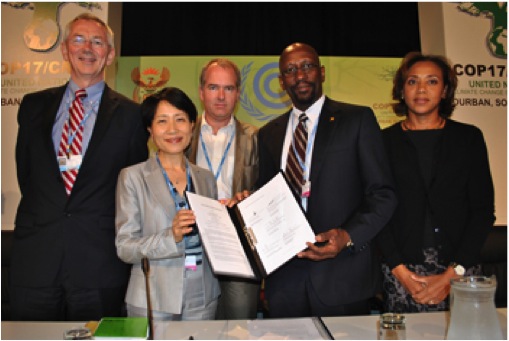Above: foreground, Naoko Ishii and Karl Hood
By the Caribbean Journal staff
The government of Japan has announced a $15 million grant to support clean energy efforts by Small Island States.
The money targets the SIDS-DOCK partnership, an initiative launched last year at the UN Climate Conference in Cancun with a pledge of $14.5 million from the Danish government.
“We are very pleased to join the epoch-making SIDS-DOCK porgramme, which can be a game-changer for the small island states that are facing the immediate threat of climate change,” said Naoko Ishii, deputy vice minister of finance for international affairs and special advisor to Japan’s Minister of Finance for Global Environmental Affairs.
The partnership, which was created by the Alliance of Small Island States, the World Bank and the United Nations Development Programme, provides financial and technical support for small island countries to improve their green energy efforts.
“SIDS-DOCK will help us create a development pathway that leads only to renewable energy, and to create that in such a way that we can say to the world, yes, though we are not responsible for the problems here, we are showing that we are responsible in trying to emit less carbon for a space for our children and our children’s children,” said Grenadian Foreign Minister Karl Hood. “We do welcome Japan’s input here. We are very thankful for the World Bank and the UNDP and also Denmark, which has capitalised the fund in the first place.”
The programme has already supported feasibility studies on alternative energy across the Caribbean, as well as on interconnecting the electricity markets of the region.
“The SIDS-DOCK Partnership generates a triple win for small islands,” said Michelle Gyles-McDonnough, UN Resident Coordinator and UNDP Resident Representative for Barbados and the OECS. “The SIDS-DOCK partnership will not only help to increase energy independence and build resilience for these nations, but it will also allow them to lead — to demonstrate innovative mitigation strategies in the face of resource constraints.”
